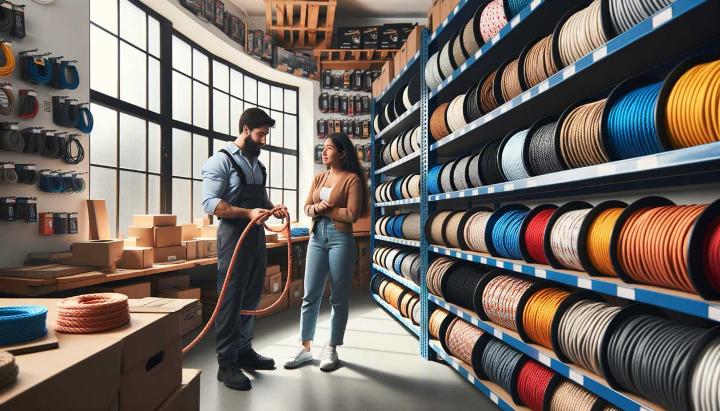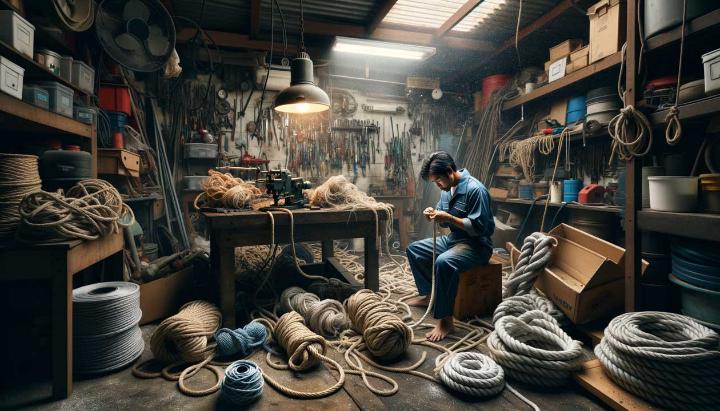Imagine you're out on an off-road adventure, your vehicle stuck in a muddy quagmire – the right rope could mean the difference between a quick recovery and a long wait for help. Whether you're an outdoor enthusiast, a professional in heavy industries, or navvying a yacht, selecting the appropriate type of rope is crucial. Two of the most popular options are nylon lines and winch lines, each boasting distinct characteristics and tailored uses. In this post, we'll delve into the nuances of nylon lines and winch lines, highlighting their best applications and unique benefits.
From anchoring your boat with stretchy and resilient nylon to leveraging the superior strength and minimal stretch of winch lines, making the right choice can elevate your project's safety and efficiency. We'll also explore how iRopes' customizable synthetic lines offer unparalleled performance and adaptability, meeting the diverse needs of industries worldwide. Keep reading to discover the key differences and optimal uses of these high-quality ropes, and learn why trusting iRopes for your rope solutions can give you the edge in any endeavour.
Comparing Nylon and Synthetic Winch Lines
Let's start by taking a look at the different types of winch lines available. Steel cables have long been the go-to choice for heavy-duty winching tasks, but synthetic ropes are quickly gaining popularity due to their unique advantages. One type of synthetic material you may have heard of is nylon – it's commonly used for general-purpose ropes and lines. However, when it comes to winch lines, nylon may not be the best option. That's where specialized synthetic fibers like Dyneema, Technora, and Vectran come into play.

Advantages of Synthetic Winch Lines
- Lightweight yet strong – Synthetic winch ropes can be up to 80% lighter than traditional steel cables, yet they boast incredible breaking strengths that often exceed those of steel.
- Increased flexibility – These ropes have a reduced kinking tendency and smaller bending radius, making them easier to handle and maneuver around tight spaces.
- Superior abrasion and UV resistance – The synthetic fibers are designed to withstand harsh environments, resisting abrasion, UV exposure, and other forms of damage better than steel.
- Easier handling – No more worrying about painful splinters or burrs – synthetic winch lines are smooth and comfortable to work with.
Drawbacks of Synthetic Winch Lines
- Excessive stretching with nylon – While nylon ropes are stretchy, which can be useful in some applications, that same stretchiness makes them unsuitable for winching tasks where minimal elongation is crucial.
- Potential heat buildup – Certain synthetic insulators can generate heat buildup during heavy winching operations, which could compromise the rope's integrity.
- Careful use and storage required – Synthetic ropes are more susceptible to damage from UV exposure, chemical contamination, and other environmental factors, so proper handling and storage are essential.
- Higher upfront costs – High-quality synthetic winch lines can be more expensive than their steel counterparts, but their durability and long-term cost savings often make up for the initial investment.
While synthetic winch lines offer numerous advantages, steel cables may still be the better choice in extremely harsh or abrasive environments where the ropes could sustain excessive damage. It all comes down to understanding your specific needs and choosing the right tool for the job.
Best Uses for Nylon Lines and Tubing
When it comes to versatile and durable materials, nylon stands out as a true workhorse. This synthetic polymer has found its way into countless applications across various industries, from heavy-duty industrial tubing to lightweight fishing lines. Its strength, flexibility, and resistance to wear and tear make it an ideal choice for a wide range of projects and outdoor activities.
Nylon's Versatility
From anchoring boats to securing camping gear, nylon lines and tubing are up for the challenge.
Industrial Applications of Nylon Tubing
Nylon tubing is a go-to choice for various industrial applications due to its strength and chemical resistance. Its ability to withstand high pressures and corrosive environments makes it ideal for applications such as:
- Hydraulic hoses – Nylon tubing is commonly used in hydraulic systems, providing a durable and reliable solution for transferring fluids under high pressure.
- Fuel and vacuum lines – The chemical resistance of nylon tubing makes it suitable for fuel lines and vacuum lines in automotive and industrial environments.
- Robotics and automation – In the world of robotics, nylon tubing offers flexibility and durability for air and fluid lines, ensuring smooth and efficient operations.
Advantages of Nylon for Fishing Lines
When it comes to fishing, nylon lines are a popular choice among anglers for several reasons. First and foremost, their lightweight nature and high tensile strength make them perfect for long casts and battling with powerful catches. Unlike cotton or polyester lines, nylon fishing lines can withstand the wear and tear of repeated use, ensuring a reliable and long-lasting performance.

But nylon's versatility doesn't stop there. It's also commonly used in the production of fishing nets, ropes, and tarpaulins, offering a perfect balance of durability and flexibility for outdoor adventures.
Whether you're an industrial professional, an avid angler, or an outdoor enthusiast, nylon lines and tubing offer a reliable and versatile solution for a wide range of applications. With their strength, durability, and resistance to various elements, nylon products from iRopes are sure to meet your needs and exceed your expectations.
Best Uses for Winch Lines: Exploring Versatile Applications
When it comes to heavy-duty tasks that demand brute strength and unwavering reliability, winch lines are the go-to solution. These specialized ropes, often constructed from high-performance synthetic fibers like Dyneema, Technora, or Vectran, pack a punch that far surpasses their weight, making them invaluable tools in various industries and outdoor pursuits.
But what exactly sets winch lines apart, and why are they the preferred choice for certain applications? It all boils down to their exceptional strength, minimal stretch, and superior abrasion resistance – properties that make them well-suited for tackling challenging situations where failure is simply not an option.
Off-Road Recovery and Vehicle Extraction
If you're an avid off-road enthusiast or overlander, you know the thrill of exploring rugged terrains – and the occasional mishap of getting stuck in a precarious situation. This is where winch lines truly shine, providing a lifeline for recovering your vehicle safely and efficiently.

Proper rigging and safe winching techniques are crucial in these situations, and winch lines are designed to handle the immense loads and abrasion that come with extracting a vehicle from treacherous terrain. Whether you're self-recovering or assisting a fellow adventurer, the right winch line can make all the difference in ensuring a successful and secure operation.
Landscaping and Heavy Object Relocation
Beyond off-road adventures, winch lines have also proven their worth in landscaping and construction projects. Need to relocate a massive boulder or log? Or perhaps you're working on a site that requires moving heavy equipment or materials? These rugged ropes are up to the task, allowing you to harness the power of winches or pulley systems to maneuver cumbersome objects with precision and control.
The high strength-to-weight ratio of synthetic winch lines makes them incredibly versatile in these scenarios, enabling you to tackle jobs that would otherwise require a much larger workforce or specialized machinery. And with their minimal stretch and abrasion resistance, you can trust that your winch line will maintain its integrity, even when subjected to demanding conditions.
Unconventional Uses: Zip Lines and Outdoor Adventures
While winch lines are primarily associated with heavy-duty applications, their remarkable capabilities have also opened up a world of unconventional uses for outdoor enthusiasts and thrill-seekers. Imagine setting up a zip line across a scenic landscape or using a winch line to haul gear and supplies on a remote hiking or camping trip.
The possibilities are endless, and with the proper safety precautions and adherence to local regulations, winch lines can transform your outdoor adventures into unforgettable experiences. From tree removal and forestry tasks to creating unique recreational setups, these versatile ropes are ready to take on any challenge you throw their way.
So, whether you're tackling rugged off-road trails, landscaping projects, or embarking on outdoor adventures, make sure to equip yourself with the right winch lines. With their unparalleled strength, minimal stretch, and superior abrasion resistance, these specialized ropes are the ultimate tools for conquering any obstacle that stands in your way.
Advantages of Synthetic Ropes: Superior Performance and Versatility
In the ever-evolving world of ropes and lines, synthetic materials have emerged as game-changers, offering unparalleled performance and versatility that traditional natural fibers simply can't match. As industries and outdoor enthusiasts alike demand increasingly robust and reliable solutions, synthetic ropes have risen to the challenge, quickly gaining popularity across a wide range of applications.
Can you recall the last time you had to untangle a mess of twisted, frayed ropes? Or perhaps you've experienced the frustration of a natural fiber line snapping under excessive load or succumbing to the elements? If so, you'll appreciate the extraordinary advantages that synthetic ropes bring to the table.

Strength and Lightweight Properties
One of the most striking advantages of synthetic ropes is their remarkable strength-to-weight ratio. These lightweight marvels boast incredible tensile strengths that often outperform their steel counterparts, making them the perfect choice for heavy-duty applications where weight and portability are crucial factors.
Imagine hauling a heavy load through rugged terrain or rigging a complex pulley system – synthetic ropes offer the brawn you need without the cumbersome weight. And let's not forget about shock absorbency – many synthetic fibers have an inherent ability to stretch and dissipate energy, reducing the risk of sudden snaps or failures under extreme loads.
Durability and Longevity Benefits
In the world of ropes, durability is paramount, and synthetic materials excel in this regard. Designed to withstand the harshest environmental conditions, these ropes are engineered to resist abrasion, UV radiation, and chemical exposure, ensuring a longer lifespan and reduced maintenance requirements.
Whether you're battling the relentless sun on a tropical sailing adventure or navigating through harsh industrial environments, synthetic ropes will remain your trusty companions, retaining their structural integrity and performance over extended periods.
Unmatched Durability
Synthetic ropes are engineered to withstand the toughest conditions, ensuring long-lasting performance and reliability.
Safety and Ease of Use Advantages
Beyond their exceptional strength and durability, synthetic ropes also offer invaluable safety and ease-of-use benefits. With their smooth surfaces and flexible nature, these ropes are a pleasure to work with, reducing the risk of painful splinters or burrs that can plague traditional natural fiber lines.
Whether you're an avid rock climber, a professional arborist, or a maritime worker, the improved grip and maneuverability of synthetic ropes can significantly enhance your safety and efficiency on the job. And let's not forget about the convenience of storage and transportation – synthetic ropes can be easily coiled and stowed, saving valuable space and minimizing the risk of tangling or kinking.
From the rugged offshore platforms to the serene hiking trails, synthetic ropes have proven their worth time and again, catering to a diverse range of applications and demanding environments. With their unparalleled performance, durability, and user-friendly nature, these cutting-edge materials are revolutionizing the way we approach ropes and lines, setting new standards for reliability and versatility.
Choosing between nylon lines and winch lines is crucial for optimal performance in various applications. Nylon lines are ideal for tasks requiring shock absorption and stretch, such as anchoring and mooring, offering a comfortable grip and versatility. In contrast, winch lines are designed for heavy-duty lifting and pulling, providing superior abrasion resistance and minimal stretch, making them perfect for use with winches and pulleys. With iRopes’ synthetic lines, you gain high-quality, customizable solutions tailored to your specific needs, backed by advanced manufacturing techniques and competitive pricing. Make the right choice for your application and experience the advantages iRopes offers in the global market.
Get in Touch for Your Custom Rope Solutions
Please fill in the form above to explore our iRopes synthetic lines and discover how we can provide the ideal rope solutions tailored to your unique applications. We'd love to assist you with your specific requirements.